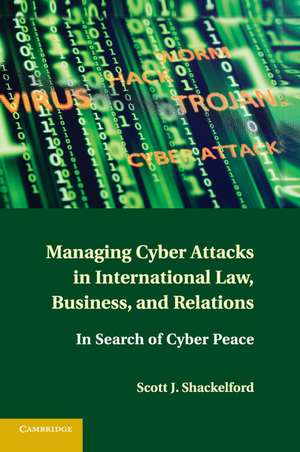Managing Cyber Attacks in International Law, Business, and Relations: In Search of Cyber Peace
Autor Scott J. Shackelforden Limba Engleză Paperback – 20 ian 2016
| Toate formatele și edițiile | Preț | Express |
|---|---|---|
| Paperback (1) | 324.40 lei 6-8 săpt. | |
| Cambridge University Press – 20 ian 2016 | 324.40 lei 6-8 săpt. | |
| Hardback (1) | 570.82 lei 6-8 săpt. | |
| Cambridge University Press – 9 iul 2014 | 570.82 lei 6-8 săpt. |
Preț: 324.40 lei
Nou
Puncte Express: 487
Preț estimativ în valută:
62.07€ • 65.04$ • 51.32£
62.07€ • 65.04$ • 51.32£
Carte tipărită la comandă
Livrare economică 12-26 aprilie
Preluare comenzi: 021 569.72.76
Specificații
ISBN-13: 9781316600122
ISBN-10: 1316600122
Pagini: 434
Ilustrații: 14 b/w illus. 5 tables
Dimensiuni: 152 x 229 x 23 mm
Greutate: 0.58 kg
Editura: Cambridge University Press
Colecția Cambridge University Press
Locul publicării:New York, United States
ISBN-10: 1316600122
Pagini: 434
Ilustrații: 14 b/w illus. 5 tables
Dimensiuni: 152 x 229 x 23 mm
Greutate: 0.58 kg
Editura: Cambridge University Press
Colecția Cambridge University Press
Locul publicării:New York, United States
Cuprins
Part I. Foundations of Polycentric Regulation in Cyberspace: 1. Defining the cyber threat in Internet governance; 2. Who controls cyberspace? Analyzing cyberspace through polycentric governance; Part II. Managing Vulnerabilities: 3. Hacking the planet, the Dalai Lama, and you: managing technical vulnerabilities in the Internet; 4. The new cyberwarfare: securing critical national infrastructure in the digital age; 5. Risky business: enhancing private sector cybersecurity through the competitive market; Part III. The Law, Politics, and Promise of Cyber Peace: 6. The law of cyber war and peace; 7. Cyber peace.
Recenzii
''Interdisciplinary' is often overused to the point of being meaningless, but Shackelford truly demonstrates the real value of practical, truly interdisciplinary thinking that is required to confront the escalating challenges of international cyber risks. Piecemeal approaches of only policy, technology, or geography are inadequate to the challenge, and Shackelford's background and expertise shine through in timely and useful guidance for the many of us who deal with these challenges every day.' Brad Wheeler, Vice President for IT and CIO, Indiana University
'Professor Scott Shackelford's Managing Cyber Attacks in International Law, Business, and Relations is the first work to deftly surmount the interdisciplinary barriers that have so hobbled effective discourse in the stove-piped field of cyber security. His argument for employing polycentric governance to securing 'cyber peace' is both novel and thought-provoking - it is out-of-the-box thinking at its best. While every reader may not be convinced by Shackelford's vision, all will be challenged to revisit their own views on the subject.' Michael Schmitt, Director, Stockton Center for the Study of International Law, Naval War College, and Director, Tallinn Manual and Tallinn 2.0 projects
'Shackelford tackles the complexities of cyber policy formulation and in a time when others are focusing too much on cyber war, he offers a fresh route to achieve cyber peace.' Richard A. Clarke, former National Coordinator for Security, Infrastructure Protection, and Counter-terrorism for the United States, and author of Cyber War: The Next Threat to National Security and What to Do About It
'Scott Shackelford's Managing Cyber Attacks in International Law, Business, and Relations is a must-read for anyone interested in cybersecurity. By turns informative, yet hopeful, it provides a good outline of one potential avenue to cyber peace. Shackelford's book is thought-provoking and innovative, even when you disagree with him.' Paul Rosenzweig, Georgetown Professor and former Deputy Assistant Secretary for Policy, Department of Homeland Security
'Professor Scott Shackelford's book is a timely intervention to press for cyber peace at a time when many nations, global institutions and enterprises are threatened by cyberattacks. I urge all readers of this excellent treatise to take its lessons to heart and seek greater multistakeholder cooperation to combat the growing array of cyber threats around the world … Shackelford ably explores the dynamics of cyber threats and the security implications of fractured Internet governance, the weapons that are continuously evolving to strike at the vulnerabilities in cyberspace, and the urgent need to secure critical national infrastructure in the digital age and embrace cybersecurity best practices in order to prevent cyber war and secure cyber peace.' Dr Hamadoun I. Touré, Secretary-General, International Telecommunication Union (from the Foreword)
'Amid a growing collection of narrow, stove-piped treatments of the topic of cyber security, Professor Shackelford offers a truly holistic look at one of the world's most pressing security dilemmas. Equal parts law, politics, and business, this compelling text is essential reading for anyone interested in gaining a more complete and informed perspective on cyber security. Shackelford impressively reduces the formidable legal and technical barriers to understanding this challenging subject, all the while maintaining an admirably high level of sophistication and nuance.' Sean Watts, Creighton University School of Law, and co-author of the Tallinn Manual on the International Law Applicable to Cyber Warfare
'Scott Shackelford is the rare scholar with expertise in the practical functioning of the Internet, its commercial and communication context, and the international law essential to governing this truly global phenomenon. The value of his expertise is seen in the goal of his book - getting the world to focus on cyber peace instead of nihilistic cyber war.' Mary Ellen O'Connell, Robert and Marion Short Professor of Law, University of Notre Dame
'Making and maintaining cyber peace is [a] compelling international challenge. This book affords a fresh and original approach to the vexed problem of dealing with cyber attacks in a world grown wary of new international treaties and with lax to non-existent enforcement mechanisms for such law as does apply. Shackelford extends the model of polycentric governance to the arena of cybersecurity, recommending that the partial vacuum of norms be filled with a wide variety of security and enforcement structures, from bilateral treaties and regional partnerships to industry and trade organizations. A must-read book for every stakeholder.' Don Howard, Director, Reilly Center for Science, Technology, and Values, University of Notre Dame
'Professor Scott Shackelford's Managing Cyber Attacks in International Law, Business, and Relations is the first work to deftly surmount the interdisciplinary barriers that have so hobbled effective discourse in the stove-piped field of cyber security. His argument for employing polycentric governance to securing 'cyber peace' is both novel and thought-provoking - it is out-of-the-box thinking at its best. While every reader may not be convinced by Shackelford's vision, all will be challenged to revisit their own views on the subject.' Michael Schmitt, Director, Stockton Center for the Study of International Law, Naval War College, and Director, Tallinn Manual and Tallinn 2.0 projects
'Shackelford tackles the complexities of cyber policy formulation and in a time when others are focusing too much on cyber war, he offers a fresh route to achieve cyber peace.' Richard A. Clarke, former National Coordinator for Security, Infrastructure Protection, and Counter-terrorism for the United States, and author of Cyber War: The Next Threat to National Security and What to Do About It
'Scott Shackelford's Managing Cyber Attacks in International Law, Business, and Relations is a must-read for anyone interested in cybersecurity. By turns informative, yet hopeful, it provides a good outline of one potential avenue to cyber peace. Shackelford's book is thought-provoking and innovative, even when you disagree with him.' Paul Rosenzweig, Georgetown Professor and former Deputy Assistant Secretary for Policy, Department of Homeland Security
'Professor Scott Shackelford's book is a timely intervention to press for cyber peace at a time when many nations, global institutions and enterprises are threatened by cyberattacks. I urge all readers of this excellent treatise to take its lessons to heart and seek greater multistakeholder cooperation to combat the growing array of cyber threats around the world … Shackelford ably explores the dynamics of cyber threats and the security implications of fractured Internet governance, the weapons that are continuously evolving to strike at the vulnerabilities in cyberspace, and the urgent need to secure critical national infrastructure in the digital age and embrace cybersecurity best practices in order to prevent cyber war and secure cyber peace.' Dr Hamadoun I. Touré, Secretary-General, International Telecommunication Union (from the Foreword)
'Amid a growing collection of narrow, stove-piped treatments of the topic of cyber security, Professor Shackelford offers a truly holistic look at one of the world's most pressing security dilemmas. Equal parts law, politics, and business, this compelling text is essential reading for anyone interested in gaining a more complete and informed perspective on cyber security. Shackelford impressively reduces the formidable legal and technical barriers to understanding this challenging subject, all the while maintaining an admirably high level of sophistication and nuance.' Sean Watts, Creighton University School of Law, and co-author of the Tallinn Manual on the International Law Applicable to Cyber Warfare
'Scott Shackelford is the rare scholar with expertise in the practical functioning of the Internet, its commercial and communication context, and the international law essential to governing this truly global phenomenon. The value of his expertise is seen in the goal of his book - getting the world to focus on cyber peace instead of nihilistic cyber war.' Mary Ellen O'Connell, Robert and Marion Short Professor of Law, University of Notre Dame
'Making and maintaining cyber peace is [a] compelling international challenge. This book affords a fresh and original approach to the vexed problem of dealing with cyber attacks in a world grown wary of new international treaties and with lax to non-existent enforcement mechanisms for such law as does apply. Shackelford extends the model of polycentric governance to the arena of cybersecurity, recommending that the partial vacuum of norms be filled with a wide variety of security and enforcement structures, from bilateral treaties and regional partnerships to industry and trade organizations. A must-read book for every stakeholder.' Don Howard, Director, Reilly Center for Science, Technology, and Values, University of Notre Dame
Notă biografică
Descriere
This book presents a novel framework to reconceptualize internet governance and better manage cyber attacks.








